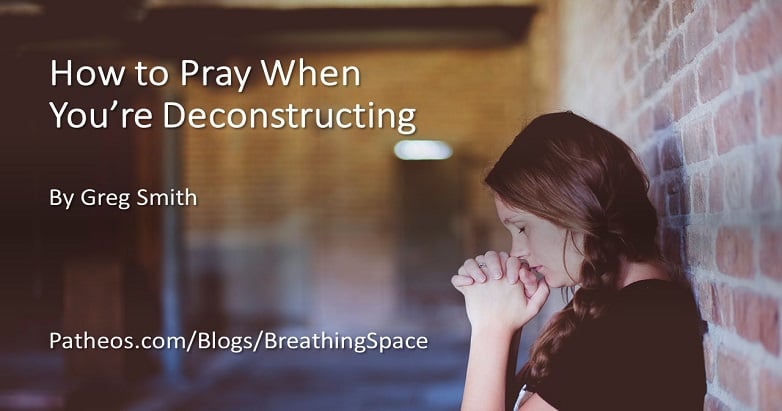Christians who deconstruct their faith often feel so overwhelmed with questions without answers that prayer becomes difficult. Sometimes it seems that there is no God listening to your prayers. At other times you may feel God’s presence intimately but have no idea what to say. For all these prayer problems, Lectio Divina offers an answer.

Lectio Divina
Centuries ago, Benedict of Nursia introduced to his desert monks a practice called Lectio Divina that is perfect for people going through the difficult process of deconstruction. First, you begin with Lectio, or Divine Reading. Click here to read my article on the first step. This involves reading a passage of scripture several times to find a word or phrase that stands out to you. This sacred word becomes your mantra, or Logos, that you repeat to yourself. Click here to read my article about the second step, Meditatio, meditation. The third step is called Oratio, or Prayer.
When you feel distanced from God, it helps to have a prayer assignment. Start by practicing Divine Reading. Once you have found your sacred word through the first step of Lectio, and repeated that word in Meditatio, it’s time to pray that word. This way, instead of trying to figure out what to pray about, the topic has already come to you through scripture.
Logos and the Lord’s Prayer
One method of praying the Logos, or the Word, is to use the Lord’s Prayer as your outline, but to let the sacred word be the subject. For example, let’s suppose the scripture you read during the Lectio step was the twenty-third psalm. The word that stood out to you was shepherd. How can you pray about that word, using the Lord’s Prayer as your outline?
- Our Father, which art in heaven, hallowed be thy name. This section is all about God and God’s identity. Since your word was shepherd, this is fairly easy. Take this time in your prayer to focus on God as the divine shepherd. Expand that notion and think about all the ways that a shepherd leads their sheep. What does God’s identity as shepherd mean to you?
- Thy kingdom come; thy will be done on Earth as it is in heaven. This section is about God’s will. Focus your prayer on how a shepherd might communicate their will to the sheep, and how the sheep might understand the shepherd’s purpose. What does this mean in your life today?
- Give us this day our daily bread. Think about how the shepherd leads the sheep to fresh green grass every day and how the sheep never need to concern themselves about their next meal. Worrying about that is the shepherd’s job. How have you taken that responsibility on yourself, instead of trusting the shepherd to give you what you need every day?
- Forgive us our trespasses as we forgive those who trespass against us. Think about how sheep often wander away from the flock, trespassing where they don’t belong. How has God as Shepherd reached out to you to bring you back into the fold? How have others trespassed against you? Can you see the way God has brought them back as well? If the shepherd has been so gentle with you, how can you be gentle with the other sheep who are not so different from you after all?
- Lead us not into temptation but deliver us from evil. Through the lens of the word shepherd, this phrase invites you to consider how the Good Shepherd never leads a sheep into danger. During this time in your prayer, you might feel like a lamb in the arms of the shepherd and rest securely in the knowledge that God is taking care of you.
- For thine is the kingdom and the power and the glory forever. Honestly, sometimes it’s hard to make the sacred word from every Bible reading fit into the Lord’s prayer. Occasionally, the two might even seem contradictory—like kingdom, power, and glory contrasted with the poverty of a shepherd. But maybe the contradiction is worth embracing. Jesus did this when he entered the incarnation, exchanging divine glory for human suffering. The Christian life invites us to do the same thing. This is a powerful observation that you might miss if you dismiss the contradiction between the final phrase in the Lord’s Prayer and the word shepherd. When praying the Logos, don’t be afraid to explore and embrace contradictions because they are sometimes the source of the greatest insights.
Oratio with the Logos
Praying the Lord’s Prayer through the lens of the word shepherd is just one example. This assumes that the scripture you read in your devotion time is Psalm 23. But what if you’re reading other passages? The same principle applies. If you’re reading 1 Corinthians 13 and the word love stands out to you, then Love is the Logos, the lens through which you pray the Lord’s Prayer. Each phrase of the Lord’s Prayer, then, is seen in the context of love.
You can use this same principle with any scripture. The sacred word that stands out to you from scripture becomes the lens through which you pray the Lord’s Prayer. This is easier to do with some scriptures, and harder with others, but if you embrace the challenge then it will give you a way to continue praying even while you’re deconstructing. Your sacred word will change every time you read scripture, but the Lord’s Prayer remains the same. That new Logos gives depth to a familiar prayer that you might otherwise rattle off without thinking.
No one said that deconstruction is easy. Dismantling your faith to build it back up again (or not) is some of the hardest work you’ll ever do. But you don’t have to do it bereft of spirituality. With Lectio Divina as a blueprint, you can deconstruct on purpose rather than letting your faith simply fall apart. You can engage in vibrant spirituality even while refurbishing your theology.












